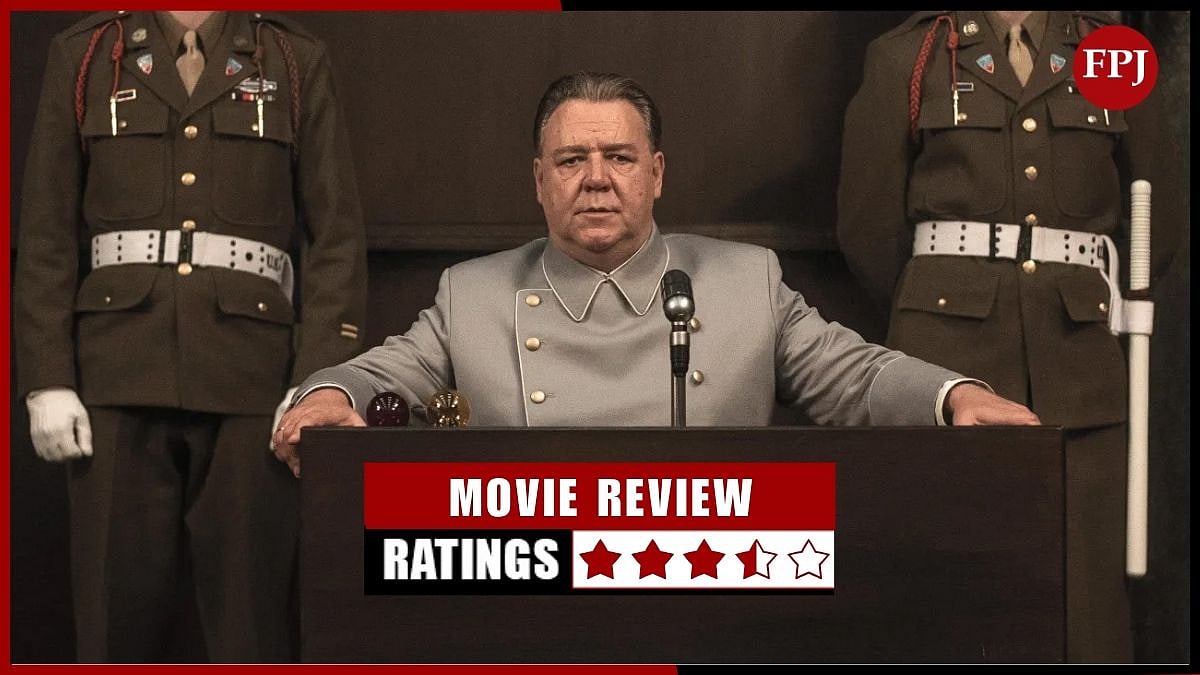Nuremberg Review: A Commanding Russell Crowe And Earnest Rami Malek Stand Out In Not So Bite-Worthy Oscar-Bait Drama
Nuremberg is tailor-made for the Oscars season. It may land nominations for its performances—especially Crowe’s—but as a film, it falls short of true psychological insight.

Nuremberg Review: A Commanding Russell Crowe And Earnest Rami Malek Stand Out In Not So Bite-Worthy Oscar-Bait Drama |
Title: Nuremberg
Director: James Vanderbilt
Cast: Russell Crowe, Rami Malek, Michael Shannon, John Slattery, Richard E Grant, Leo Woodall, Lydia Peckham
Where: In theatres near you
Rating: 3.5 Stars
Nuremberg was the site of Hitler’s Nazi Party hosting some of its biggest anti-Jewish, hate-led rallies—and where Hermann Göring, Hitler’s second-in-command and the de facto vice to the Führer, announced the infamous Nuremberg Laws. Built like a Roman gladiatorial arena, this massive structure symbolized power and dominance for the Third Reich. Ironically, it later became the stage for the war crimes tribunal against Nazi leadership after World War II.
James Vanderbilt—whose eclectic résumé includes writing David Fincher’s Zodiac, Scream, and The Amazing Spider-Man—both writes and directs this classic-style Hollywood drama about the setup and outcome of this history-making trial. At its core is a psychiatrist tasked with assessing the mental state of Nazi war criminals, particularly Hermann Göring, commander of the Luftwaffe and one of the chief architects of the Holocaust. While the film boasts technical finesse and solid performances, its exploration of the minds of evil men remains surface-level, with a tendency to subtly preach about parallels to present times.
Lieutenant Douglas Kelley (Rami Malek), an Army psychiatrist, is assigned to ensure the mental fitness of leading Nazi war criminals, the most significant among them being Göring (Russell Crowe). His mission, as stated by prison in-charge Colonel Burton C. Andrews (John Slattery), is to make sure these men live long enough to face trial and justice. Meanwhile, Supreme Court Justice Robert H. Jackson (Michael Shannon) leads the prosecution with his British counterpart Sir David Maxwell-Fyfe (Richard E. Grant), building an unprecedented case of war crimes and crimes against humanity.
ALSO READ
As the film progresses, Kelley’s growing fascination with Göring, who commands even his tiny prison cell with an unsettling mix of authority and charisma. When he surrendered to the Allied Forces, Göring arrived in a limousine, expecting his bags be handled—a sign of the narcissism that defines him. Portraying such a character requires nuanced restraint, to prevent it becoming nearly comical and Crowe delivers it with commanding precision. Kelley’s immersion in Göring’s psyche intensifies, revealing both the psychiatrist’s curiosity and the subject’s manipulative brilliance.
The film’s tension builds as Justice Jackson prosecutes with conviction but struggles to overcome Göring’s cold arrogance and intellectual gamesmanship. A prolonged sequence which almost feels out of place in the touched up ambience of this film is uncut footage from the concentration camps that was shown during the actual trial. The haunting images are not offered comment or conclusion. The trouble for the Allied prosecutors grow when references to Goring’s role in ordering a ‘Final Solution’ comes up in court. The climax hinges on unravelling Göring’s narcissism—something that only emerges through Kelley’s psychological study.
As a film, Nuremberg aims high—it’s clearly designed for awards season. The orchestral score swells at emotional peaks, and the dialogue has the verbose rhythm of an Aaron Sorkin screenplay. Yet, for all its polish, the film doesn’t dig deep enough into its central question: “How do you dissect evil?” Kelley seeks to understand the Nazi mind for his book, yet he—and by extension, the film— is toyed around by Goring.
ALSO READ
Actors’ performances
Rami Malek is confident and compelling as Kelley, even if his portrayal occasionally feels uneven. Michael Shannon delivers another powerful, perfectly calibrated performance. The supporting cast—each embodying real historical figures—rounds out a strong ensemble. But it is Russell Crowe who dominates. From the moral intensity of Gladiator to the corrosive power of The Loudest Voice, Crowe once again proves his unmatched range. As Göring, he is magnetic and imposing, delivering an interpretation of evil in human form that will be remembered.
FPJ verdict
Nuremberg is tailor-made for the Oscars season. It may land nominations for its performances—especially Crowe’s—but as a film, it falls short of true psychological insight. Based on Jack El-Hai’s acclaimed book The Nazi and the Psychiatrist, the film revisits a pivotal moment in modern history with style and seriousness, but doesn’t always manage to capture the emotional complexity of its subject.
Conclusion
In today’s world—where conflicts from Gaza to Ukraine remind us that justice and accountability remain fragile—the film feels timely and necessary. It reaffirms the importance of moral courage, international law, and the constant struggle to confront evil with reason. Nuremberg may not be perfect, but it succeeds in revisiting a dark chapter that shaped how the modern world defines justice.
RECENT STORIES
-
-
-
-
-